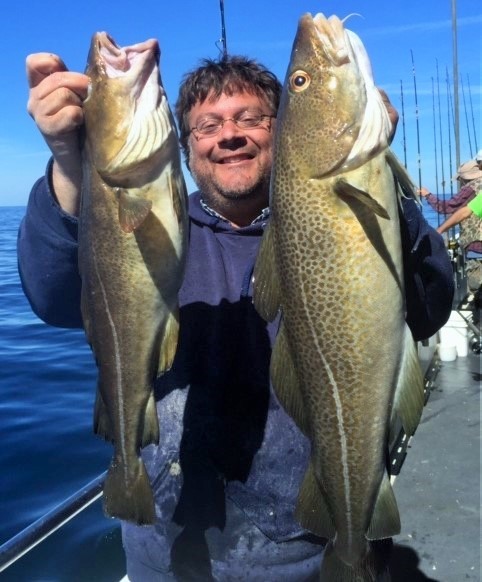Fishing community shares thoughts on menhaden
The Atlantic States Marine Fisheries Commission (ASMFC), which manages many of the saltwater species we fish in Rhode Island that travel the East Coast, held an Atlantic menhaden public hearing Monday at the URI Bay Campus.
The hearing addressed a Public Information Document (PID) that aims to incorporate ecosystem-based management strategies to manage Atlantic menhaden. The PID serves as a predecessor to an amendment (Amendment 3) to the Atlantic menhaden Fishery Management Plan scheduled to be developed next year.
About thirty recreational and commercial fishermen, fish processors, environmental groups (like Save the Bay) and fish managers attended the hearing. Two main issues were discussed at the hearing. The first issue was the use of ecosystem based management strategies to determine stock status and allowable catch limits. The second issue addressed landing timeframes which would be used to determine allocation of quota.
Recreational anglers up and down the East Coast have claimed that fishing for striped bass and other game fish is off when the quantity of Atlantic menhaden (a forage fish for striped bass) is down. Additionally, Atlantic menhaden are filter feeders with each fish processing thousands of gallons of water, filtering out plankton and helping prevent algae blooms. The Atlantic menhaden Fishery Management Plan will be the first ASMFC plan that utilizes ecosystem-based management in this fashion.
Meghan Lapp of Seafreeze, Ltd., North Kingstown (the largest producer and trader of sea-frozen fish on the East Coast) and a member of the ASMFC Atlantic menhaden Advisory Panel said, “Historically, Rhode Island has landed a lot more fish than the allocation reflects.” George Allen, representing the Rhode Island Saltwater Anglers Association (a recreational fishing association that represents thirty different fishing organizations with 7,500 members), said, “Currently one state (Virginia) takes 85 percent of the catch because of the Atlantic menhaden reduction fishery. This is inequitable for the rest of the coastal states.”
Most in attendance were in agreement that the Atlantic menhaden allocation in the northeast states, and specifically Rhode Island, should be enhanced to more accurately reflect historical catch over a longer period of time, including the time period when landings were high due to active processing plants in the northern states. So instead of using average landings between 2009 and 2011, many at the meeting were advocating for a longer time-series average extending to include years prior to 2009 such as 1985 when more accurate bait fishery landings data became available.
However, there was much disagreement in the room when it came to determining ecological reference points in estimating how many fish would be allowed to be taken out of the water. A representative from Save the Bay said, “Atlantic menhaden have great ecological value for Narragansett Bay and we advocate for existing guidelines for forage fish species until menhaden–specific ecological reference points (ERPs) are developed by the ASMFC’s Biological and Ecological Reference Point (BERP) workgroup.”
Allen from the RI Saltwater Anglers Association said, “We believe the board should manage menhaden using whatever ERP models are available today so we support Option D which will enable the menhaden population to continue to grow while increasing menhaden’s value into the economies of all coastal states and to the predators which require them as a food source.”
A representative from Ark Bait Co. of Swansea, a commercial fishing business that has actively been harvesting Atlantic menhaden in Narraganset Bay for a number of years, said, “We support a status quo position which would continue to manage menhaden with single-species biological reference points (rather than ecosystem based management strategies).”
Meghan Lapp of Seafreeze said, “We have no scientific models to follow, the value of these fish as a forage fish and their ecological value has not been proven so we should continue to manage the stock with the single-species biological reference points.”
The PID can be found on the ASMFC website at asmfc.ort. Public comments can still be made and will be accepted in writing until 5 p.m. (EST) on January 4. Comments can be sent electronically to comments@asmmfc.org (subject line: Menhaden PID).
RI Food System Summit, January 17
If you are active in the food movement in RI and/or enjoy the state’s farm to table and sea to table efforts, you may want to attend the Rhode Island Food System Summit on Tuesday, January 17, from 11 a.m. to 5 p.m. at the URI Center for Biotechnology and Life Sciences in Kingston. Preview the first statewide food plan for Rhode Island and discuss the role of local food in supporting our families and moving the state forward. Visit RelishRhody.com to register for the event or call Teri Woodbine at 401/874-5273 with questions.
Where’s the bite?
Party boats sailing for cod this time of year include the Frances Fleet at francesfleet.com, the Seven B’s (with Capt. Andy Dangelo at the helm) at sevenbs.com, and the Island Current at islandcurrent.com.
Captain Dave Monti has been fishing and shellfishing for over 40 years. He holds a captain’s master license and a charter fishing license. Visit Captain Dave’s No Fluke website at www.noflukefishing.com or e-mail him with your fishing news and photos at dmontifish@verizon.net.






